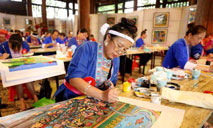Discovery of more unmarked graves turns Canada's national day into moment of shame
-- Canada Day, the country's national holiday on Thursday, turned into a moment of shame, following the discovery of the human remains of 182 people near the grounds of a former indigenous residential school near Cranbrook in the country's British Columbia province.
-- An estimated 150,000 indigenous children across Canada were reportedly removed from their homes and forced to attend residential schools between the 1890s and as recently as 1996, during which more than 50,000 died of abuses.
-- The recent discoveries of unmarked graves at former residential schools in Canada are only the tip of the iceberg of its blatant encroachment on the human rights of the indigenous people, which actually is a common practice shared by Western colonists in grabbing lands and resources.
OTTAWA, July 3 (Xinhua) -- Canada Day, the country's national holiday on Thursday, turned into a moment of shame, following the discovery of the human remains of 182 people near the grounds of a former indigenous residential school near Cranbrook in the country's British Columbia province.
Fueling fury and grief across the country, the new finding announced Wednesday brought the number of unmarked graves revealed across Canada in recent months to more than 1,000, an appalling tally that has further reminded the international community of some Western countries' bloody colonial past and ongoing mistreatment of the indigenous people.
GRIM DISCOVERIES
The latest finding followed the discovery of an estimated 751 unmarked graves near a site of the Marieval Indian Residential School in Saskatchewan. Less than a month before the finding of the 751 victims, Canada and the international community had been shocked by the remains of 215 people discovered at the site of the Kamloops Indian Residential School in British Columbia.
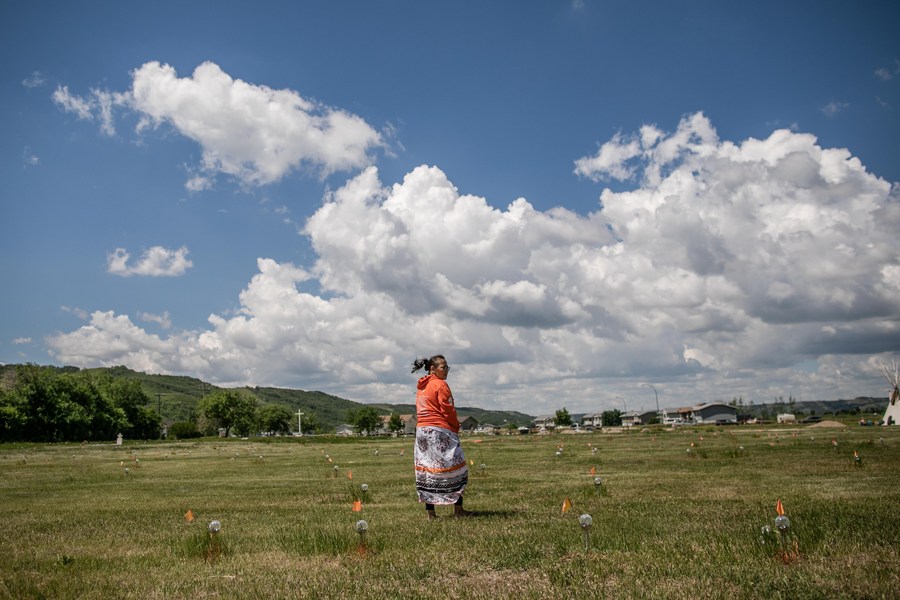
A member of the Cowessess First Nation stands at the site of unmarked graves near a former indigenous residential school in Saskatchewan, Canada, on June 27, 2021. (Photo by Amru Salahuddien/Xinhua)
The Aq'am community, a member of the Ktunaxa Nation located near the city of Cranbrook, used ground-penetrating radar to find the remains of the 182 victims close to the former St. Eugene's Mission School, the Lower Kootenay Band said in a statement on Wednesday.
"It is believed that the remains of these 182 souls are from the member Bands of the Ktunaxa Nation, neighboring First Nations communities and the community of Aq'am," the band said in the statement.
The indigenous school was operated by the Catholic Church from 1912 until the early 1970s. The building has since been converted into a resort and casino, with an adjacent golf course.
The band said up to 100 of its members were forced to attend the school.
An estimated 150,000 indigenous children across Canada were reportedly removed from their homes and forced to attend residential schools between the 1890s and as recently as 1996, during which more than 50,000 died of abuses.

Children's shoes are placed on the staircase outside Vancouver Art Gallery during a memorial event for the 215 children whose remains have been found buried at a former Kamloops residential school in Vancouver, British Columbia, Canada, May 29, 2021. (Photo by Liang Sen/Xinhua)
In 2008, the Canadian government formally admitted its role in forcing those native children into government-financed residential schools where many suffered physical and sexual abuse.
NATIONAL DAY IN SHAME
Following the horrible discoveries, many cities in Canada cancelled Canada Day celebrations. Demonstrations were held in multiple places, calling for reflection on the country's brutal colonial history.
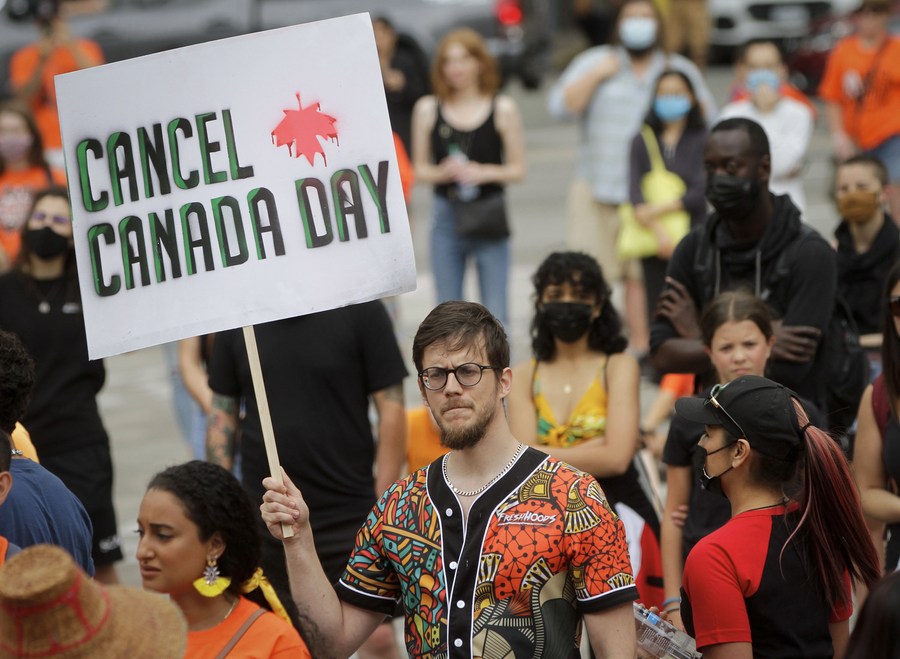
A participant holds a sign during a "Cancel Canada Day" rally in Vancouver, Canada, July 1, 2021. (Photo by Liang Sen/Xinhua)
"We will not celebrate stolen indigenous land and stolen indigenous lives," said Idle No More, an indigenous-led social movement, in a release. On social media, support for the hashtag #CancelCanadaDay soared.
"The recent discovery at Kamloops residential school has reminded us that Canada remains a country that has built its foundation on the erasure and genocide of Indigenous nations, including children," said Idle No More on the Facebook event page. "We refuse to sit idle while Canada's violent history is celebrated."
Unlike in the past, local residents did not gather wearing red and white on the national holiday. They instead joined the #CancelCanadaDay march, wearing shirts in orange, a symbolic color of survivors of Canada's residential school system.
In cities such as Ottawa and Toronto, thousands have joined a wave of orange on Thursday, with some carrying large banners with slogans like "No pride in genocide" "Happy denial day," according to local media.
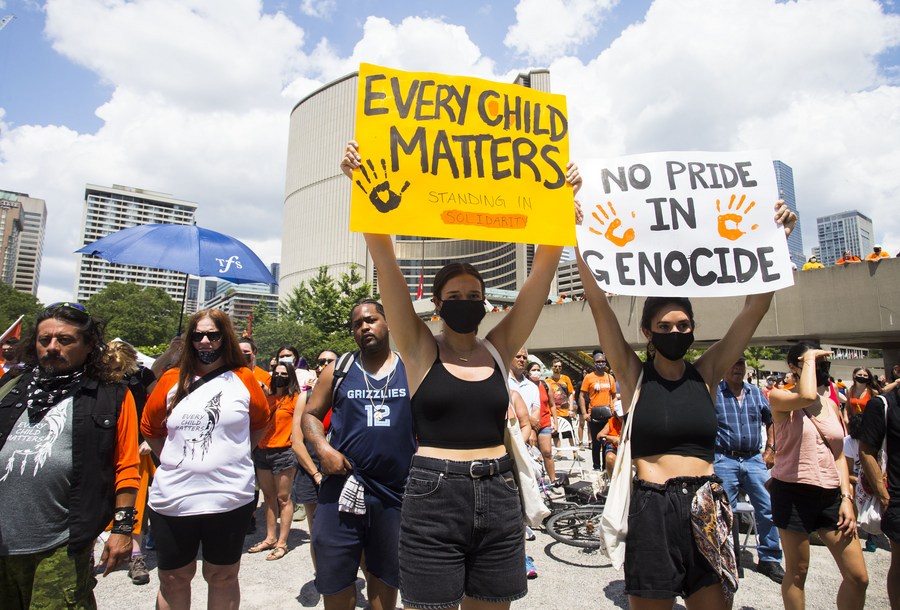
People take part in an event to mourn for victims who died of abuses by former indigenous residential schools in Toronto, Canada, on July 1, 2021. (Photo by Zou Zheng/Xinhua)
"Celebrating Canada Day is being seen as inconsiderate to all the children's lives that were lost and we encourage everyone to consider the price these children had to pay at the hands of the Canadian government," said Bobby Cameron, chief of the Federation of Sovereign Indigenous Nations in Saskatchewan, in a statement.
Perry Bellegarde, Canada's National Chief of the Assembly of First Nations, said in a video message "I urge everyone to reflect on the darkness of the past and commit to doing better as a country."
CRIME AGAINST HUMANITY
The recent discoveries of unmarked graves at former residential schools in Canada are only the tip of the iceberg of its blatant encroachment on the human rights of the indigenous people, which actually is a common practice shared by Western colonists in grabbing lands and resources.
"Now nobody can deny that the residential schools were a genocide of our people," Bellegarde said in June after the remains of 215 indigenous children were found.
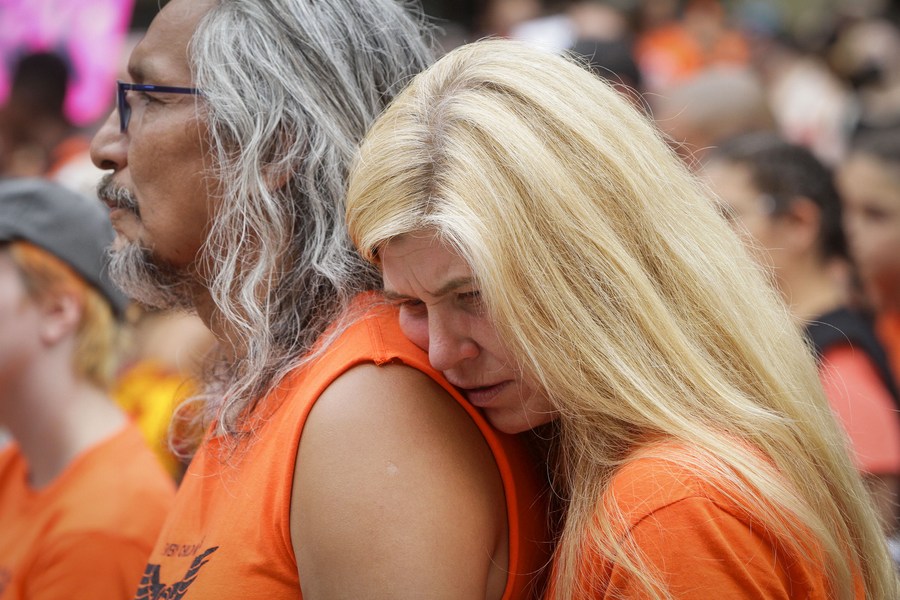
Participants react while listening to a speech during a "Cancel Canada Day" rally in Vancouver, Canada, July 1, 2021. (Photo by Liang Sen/Xinhua)
In June, independent UN human rights experts expressed their concerns over the human rights tragedy, urging Canadian authorities to probe "the circumstances and responsibilities surrounding these deaths."
"The judiciary should conduct criminal investigations into all suspicious death and allegations of torture and sexual violence against children, hosted in residential schools, and prosecute and sanction the perpetrators and concealers who may still be alive," said the experts.
In fact, Canada is not the only Western country that touts itself as a model for human rights protection. It instead has a shameful history of harsh treatments of the indigenous people.
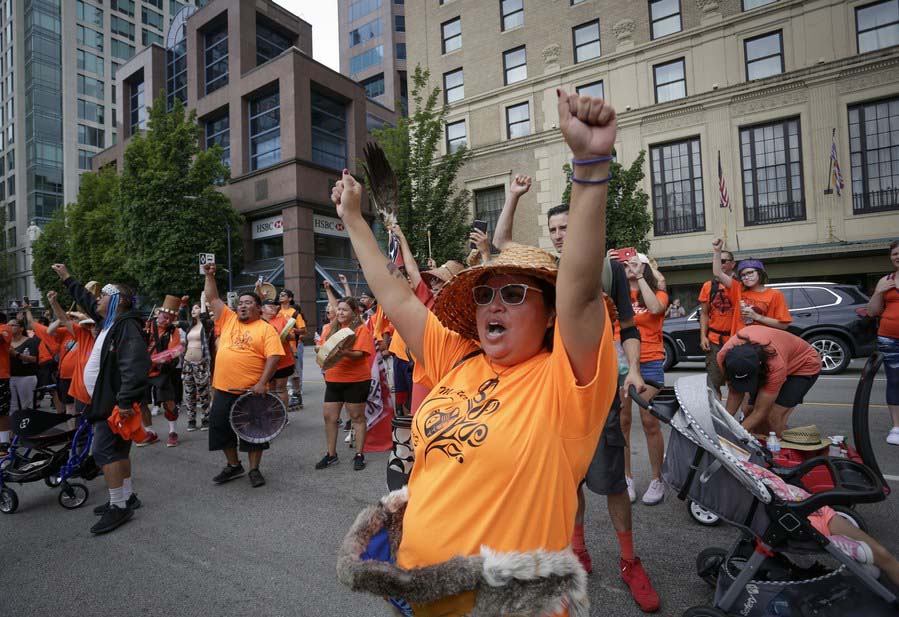
Members of the indigenous community participate in a "Cancel Canada Day" rally in Vancouver, Canada, July 1, 2021. (Photo by Liang Sen/Xinhua)
In U.S. history, there are chapters of horrific systemic ethnic cleansing and slaughter of Native Americans, which constitute genocide and crimes against humanity.
Over nearly 100 years after the United States was founded, Native Americans were expelled and killed during the Westward Expansion. Their population dwindled from 5 million at the end of the 15th century to 250,000 at the beginning of the 20th century.
Between the 19th century and the 1970s, the U.S. government sent a large number of Native American children to boarding schools, which can be called the progenitor of concentration camps.
Even more worryingly, the sufferings that the ancestors of the indigenous people had endured do not bring better future for their descendants.
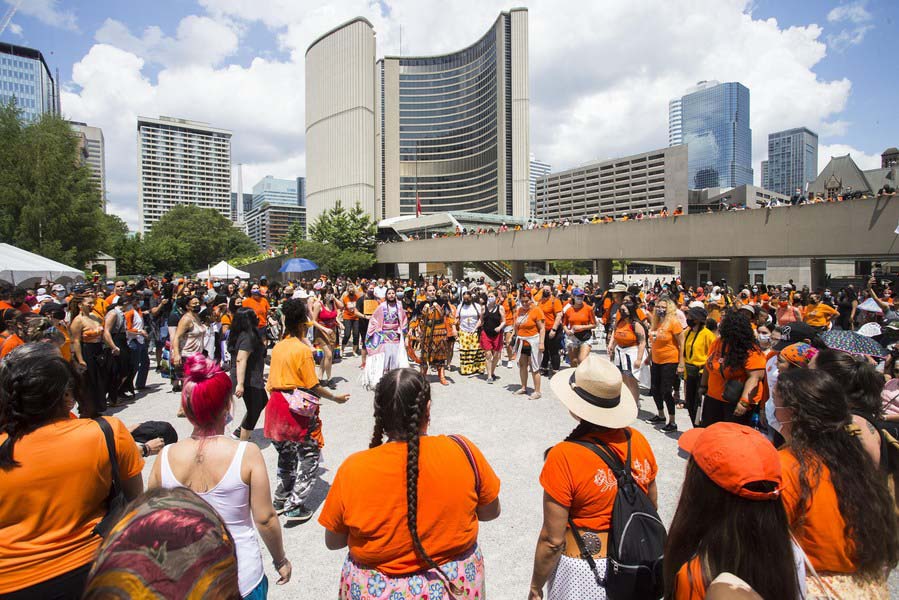
People take part in an event to mourn for victims who died of abuses by former indigenous residential schools in Toronto, Canada, on July 1, 2021. (Photo by Zou Zheng/Xinhua)
Nowadays, the indigenous people living in these "democratic" countries are still treated as second-class citizens and grappling with suppression and discrimination.
An article published by The Guardian in April said at least 474 Aboriginal and Torres Strait Islander people have died in Australia's police and prison custody over the past three decades, which was described as a "national shame" by experts.
"Aboriginal people are disproportionately arrested, remanded, and jailed, and so die at higher rates in custody as a proportion of the total population," said the article.
Photos
Related Stories
Copyright © 2021 People's Daily Online. All Rights Reserved.










